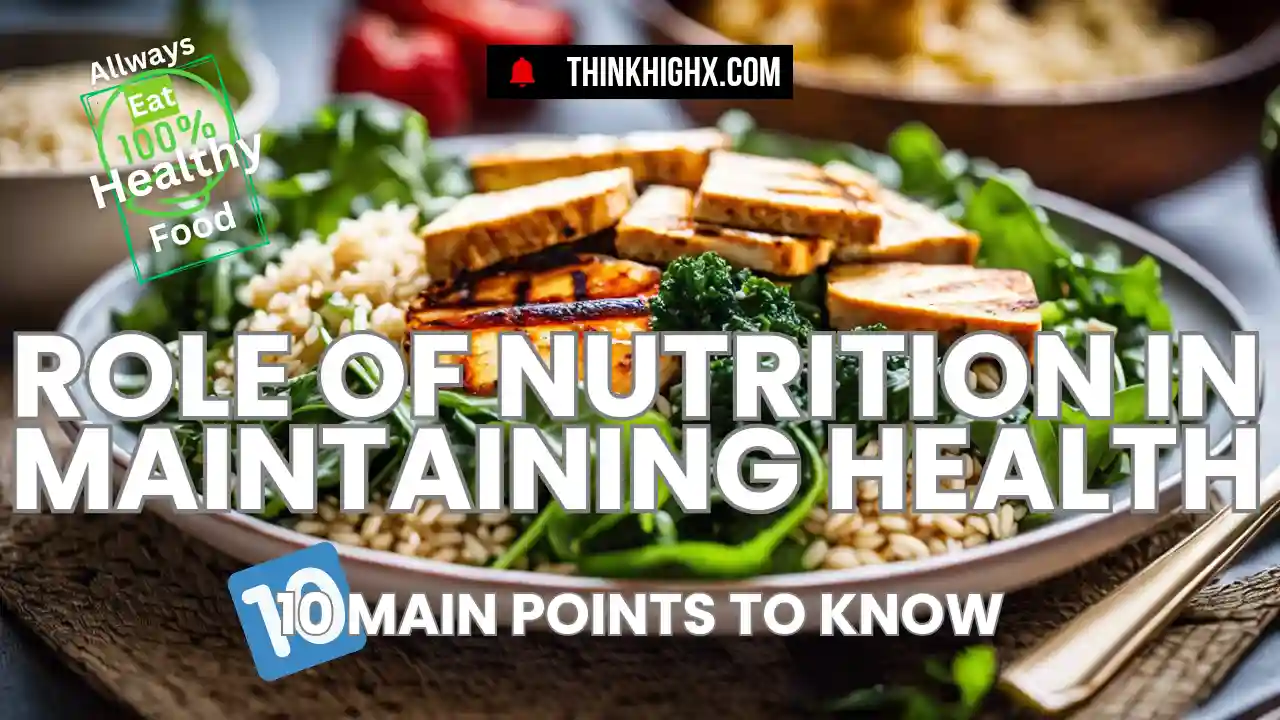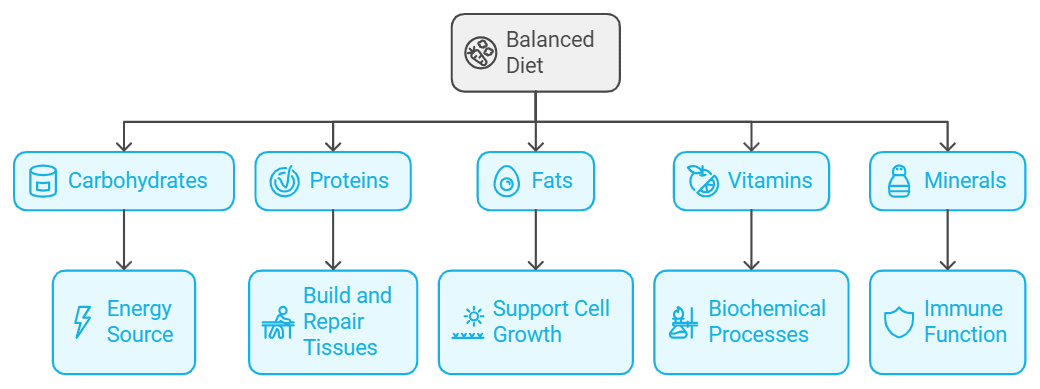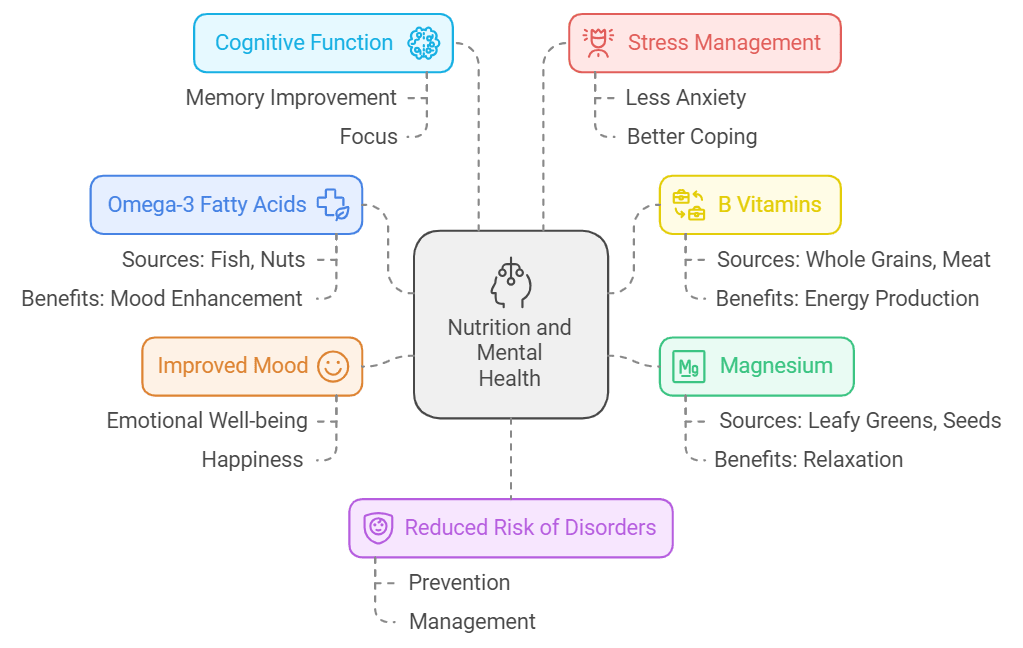Role of Nutrition in Maintaining Health: Know 10 Food Points
Table of Contents

“The food you eat can be either the safest and most powerful form of medicine or the slowest form of poison.”
Ann Wigmore
Introduction
Nutrition is the key to a healthy life. It affects every part of our body and mind. When we eat the right food, we feel better, think better, and live better. The role of nutrition in maintaining health is not just about staying fit. It is about living a life full of energy and happiness. In this article, you will learn how nutrition impacts your body, mind, and emotions. We will explore why a balanced diet is crucial for well-being and how it can help you lead a better life.
Good nutrition is the foundation of health. It supports strong muscles, healthy organs, and clear thinking. It also helps in fighting off diseases. When your body gets the right nutrients, it works well. This keeps you active and alert. But when your diet is poor, your health suffers. Understanding the role of nutrition in maintaining health can help you make smart food choices. This, in turn, will improve your overall well-being.
Breaking Down Key Nutritional Components
When we talk about the role of nutrition in maintaining health, we must understand the building blocks of a healthy diet. These are macronutrients, micronutrients, and water. Each plays a vital role in how our bodies work and how we feel. Let us look at each of these in detail.
Macronutrients and Their Role in Health
Macronutrients are the nutrients we need in large amounts. They provide energy and help our body grow, repair, and function. The three main macronutrients are carbohydrates, proteins, and fats. Understanding the role of macronutrients in health can help us choose the right foods.
- Carbohydrates: Carbohydrates are the body’s main source of energy. When we eat foods like rice, bread, and fruits, our body breaks them down into glucose. This glucose is used by our cells for energy. Carbohydrates help us stay active and alert. Complex carbohydrates, like whole grains and vegetables, provide steady energy. Simple carbs, like sugar, give quick bursts of energy but do not last long. Eating more complex carbs helps maintain stable energy levels.
- Proteins: Proteins are the building blocks of our body. They are needed to build and repair tissues. Muscles, skin, hair, and even our nails are made of proteins. Foods like eggs, meat, beans, and lentils are rich in proteins. Proteins also play a key role in making enzymes and hormones. This is why they are important for growth, healing, and overall health. Without enough protein, our body cannot repair itself well, and we may feel weak.
- Fats: Fats often get a bad name, but they are essential for our body. They provide energy, help in absorbing vitamins, and keep our skin and hair healthy. Healthy fats, like those in fish, nuts, and olive oil, are good for our heart. They also support brain function. Saturated and trans fats, found in fried foods and snacks, should be eaten in moderation. Knowing the role of macronutrients in health can guide us to eat more balanced meals, which keep us strong and active.

Micronutrients and Their Vital Role
Micronutrients are vitamins and minerals that we need in smaller amounts. Even though we need less, they are very important for good health. They help our body work properly and prevent many illnesses. The importance of micronutrients cannot be overstated, as they support various bodily functions.
- Vitamins: Vitamins are needed for many processes in our body. For example, Vitamin D helps us absorb calcium, which is important for strong bones. Without enough Vitamin D, bones can become weak, leading to problems like osteoporosis. Vitamin C boosts the immune system and helps heal wounds. It is found in citrus fruits like oranges and lemons. Vitamins A, E, and K also play key roles, from improving vision to protecting cells from damage.
- Minerals: Minerals like iron, calcium, and potassium are equally important. Iron is necessary for making red blood cells, which carry oxygen throughout the body. Without enough iron, we may feel tired and weak. Calcium is needed for strong bones and teeth. Potassium helps with muscle function and keeps our heart healthy. Foods like leafy greens, nuts, dairy products, and fish are rich in these essential minerals. Including a variety of foods in our diet ensures we get all the important micronutrients our body needs.
Hydration and Its Role in Health
Water is often forgotten when we talk about nutrition, but it is one of the most important parts of a healthy diet. The role of nutrition in maintaining health includes staying well-hydrated. Our body is about 60% water, and it needs water to function properly. Every cell, tissue, and organ in our body requires water to work.
- Digestion: Water helps in the digestion of food. It dissolves nutrients so they can be absorbed into the bloodstream. Without enough water, digestion slows down, and we may feel uncomfortable or bloated.
- Circulation: Blood is mostly water, and it carries oxygen and nutrients to all parts of the body. Staying hydrated helps in maintaining proper blood circulation. This keeps our cells healthy and energetic. When we do not drink enough water, blood becomes thicker, and circulation can slow down.
- Overall Body Function: Water helps in removing waste from the body through urine and sweat. It also keeps our body temperature normal. Whether we are working, exercising, or simply sitting, water helps us stay alert and focused. Drinking enough water each day is crucial. It is recommended to drink at least 8 glasses of water daily, but the exact amount can vary depending on age, activity level, and climate.
Proper hydration is just as important as eating the right foods. When we understand the role of nutrition in maintaining health, we see how food and water work together to keep us feeling our best.
Macronutrient | Recommended Intake (% of total calories) | Primary Functions | Key Sources |
Carbohydrates | 45-65% | Energy provision, blood sugar regulation | Grains, fruits, vegetables, legumes |
Proteins | 10-35% | Tissue building and repair, enzyme, and hormone production | Meat, fish, eggs, dairy, legumes, nuts |
Fats | 20-35% | Energy storage, vitamin absorption, hormone production | Oils, nuts, seeds, fatty fish, avocados |
How Nutrition Impacts Physical Health
Good nutrition is not just about eating; it is about fueling our body to live a healthy, active life. When we focus on balanced eating, we support every function of our body. The role of nutrition in maintaining health extends to many areas, from boosting energy to preventing diseases. Let us explore these benefits in more depth.
Nutrition and Disease Prevention
Balanced nutrition plays a crucial role in preventing many chronic illnesses. When we eat a variety of healthy foods, our body receives the nutrients it needs to stay strong and fight diseases. On the other hand, poor eating habits can lead to serious health problems like diabetes, heart disease, and obesity. The role of nutrition in maintaining health cannot be ignored, especially when it comes to disease prevention.
- Diabetes: Diabetes is a condition where the body cannot manage sugar levels properly. Eating too many sugary foods and refined carbs, like white bread and soda, can increase the risk of type 2 diabetes. On the other hand, a balanced diet with whole grains, fruits, and vegetables helps manage blood sugar levels. Foods rich in fiber, like oats, beans, and leafy greens, slow down the absorption of sugar, which helps in keeping blood sugar levels stable. Adding healthy fats and proteins, such as fish, nuts, and lean meat, also plays a role in controlling sugar spikes.
- Heart Disease: Heart disease is one of the leading causes of death worldwide. Poor nutrition, high in saturated fats, salt, and sugar, can lead to high blood pressure, high cholesterol, and clogged arteries. This increases the risk of heart disease. Choosing healthier options, like whole grains, fruits, vegetables, lean proteins, and good fats, can protect the heart. Omega-3 fatty acids, found in fish like salmon, help reduce inflammation and improve heart health. Antioxidant-rich foods, such as berries, dark leafy greens, and nuts, protect the heart by reducing damage from free radicals. Eating a balanced diet, therefore, is a form of nutrition for disease prevention.
- Obesity: Obesity occurs when a person consumes more calories than the body uses, leading to excess body fat. It increases the risk of many health issues, including heart disease, diabetes, and even certain cancers. A diet that is high in fast food, sugary drinks, and processed snacks is often the cause of weight gain. However, choosing nutrient-dense foods, like fruits, vegetables, whole grains, and lean proteins, can help maintain a healthy weight. Drinking water instead of sugary drinks is also a simple yet effective change. Understanding the role of nutrition in maintaining health is essential for avoiding obesity and its related health risks.
A diet that includes a variety of foods, with proper portions of macronutrients and micronutrients, ensures our body functions well. It also reduces the chance of developing chronic illnesses, highlighting the importance of nutrition for disease prevention.
Nutrition for Energy and Fitness
Good nutrition is like fuel for our body. Without the right nutrients, we may feel tired, weak, and unable to perform our daily tasks. Whether we are doing office work, studying, or engaging in physical activities, proper nutrition keeps our energy levels stable. The role of nutrition in maintaining health is especially evident when we consider how it affects our energy and fitness.
- Carbohydrates for Energy: Carbohydrates are the body’s primary source of energy. When we eat foods like whole grains, fruits, and vegetables, our body converts them into glucose. This glucose is used as fuel for all our activities, from walking to running. Simple carbs, such as sugary snacks and sodas, provide quick energy but fade fast, often leading to tiredness. Complex carbs, like brown rice, oats, and sweet potatoes, offer a steady release of energy throughout the day. This is why athletes and active people often focus on complex carbs to keep their energy levels up.
- Proteins for Muscle Repair: Proteins are essential for building and repairing tissues in the body. When we exercise, our muscles go through stress and need to repair themselves. Protein helps in this recovery process, making muscles stronger. Foods like chicken, fish, eggs, beans, and tofu are rich sources of protein. For those who do regular exercise, adding a protein-rich meal after a workout can help repair muscles and reduce soreness. This is also why bodybuilders and athletes focus on protein intake to improve their performance.
- Good Fats for Sustained Energy: While fats are often viewed negatively, healthy fats are an important part of a balanced diet. They provide long-lasting energy and help the body absorb vitamins like A, D, E, and K. Avocados, nuts, seeds, and fish contain healthy fats that keep us feeling full and energized. Unlike simple carbs, which give quick energy, fats release energy slowly, helping to sustain us for longer periods.
Proper hydration is also vital when discussing nutrition for fitness. Drinking enough water throughout the day helps maintain energy levels and prevents fatigue. Dehydration can cause a drop in performance, making us feel tired and sluggish.
In summary, understanding the role of nutrition in maintaining health helps us see why balanced eating is key. It keeps our energy levels stable and supports our fitness goals. Whether we are trying to stay active throughout the day or recover after a workout, proper nutrition is the foundation. The right balance of carbohydrates, proteins, and fats gives us the strength to perform at our best.
The Connection Between Nutrition and Mental Health
Good nutrition plays a big part in mental health. The role of nutrition in maintaining health is not only about the body but also the mind. The food we eat can make us feel better or worse, depending on the nutrients we take in. Understanding the link between nutrition and mental health can help people improve their mood and mental well-being.

Nutritional Influence on Mood and Cognitive Function
Certain nutrients have a direct effect on the brain. These nutrients support brain function and affect how we feel and think. For example, omega-3 fatty acids are important for brain health. Omega-3s help improve mood and can reduce feelings of sadness or anxiety. They are found in fish like salmon and sardines. When people eat enough omega-3s, they may feel more balanced emotionally.
Vitamins are also key. Vitamin B12 and folate are necessary for brain function. If you lack these vitamins, you might feel tired or down. These vitamins help keep your brain sharp and active. Leafy green vegetables, eggs, and meat contain these important nutrients.
Minerals like zinc and magnesium are also helpful for mental well-being. Zinc helps the brain handle stress, while magnesium calms the nervous system. By eating foods rich in these nutrients, people can help their mood stay steady. The role of nutrition in maintaining health includes making sure your brain works well and that your emotions stay balanced.
Emerging Trends in Nutrition
In recent years, there have been many changes in the way people approach food. The role of nutrition in maintaining health is receiving more attention, and new ideas are emerging. Among these are plant-based diets and personalized nutrition, both of which have gained popularity for their potential to improve overall health.
Plant-Based Diets
One of the biggest trends in nutrition today is the rise of plant-based diets. More people are choosing to eat less meat and focus on plant-based foods like fruits, vegetables, grains, and legumes. The benefits of plant-based diets are widely recognized, especially for heart health. Plant-based diets are rich in fiber, vitamins, and minerals, while also being low in unhealthy fats. This makes them great for reducing the risk of heart disease, high blood pressure, and stroke.
Another advantage of plant-based diets is their ability to help prevent chronic diseases. People who follow this type of diet often have lower levels of cholesterol and blood sugar. They are less likely to develop conditions like diabetes or obesity. In fact, some studies show that a well-balanced plant-based diet can help people live longer, healthier lives. By reducing the intake of processed foods and increasing plant-based options, people can better manage their weight and overall health.
Furthermore, the role of nutrition in maintaining health becomes clear when we see how plant-based diets help reduce inflammation in the body. Chronic inflammation is linked to many health problems, including arthritis, heart disease, and even some cancers. Eating a diet high in fruits, vegetables, and whole grains can help lower this inflammation, keeping the body strong and healthy.
Personalized Nutrition
Another growing trend is personalized nutrition, which takes into account each person’s unique needs. This approach focuses on creating tailored nutrition plans based on factors like genetics, lifestyle, and health conditions. Unlike one-size-fits-all diets, personalized nutrition helps individuals meet their specific health goals more effectively.
For example, some people may have genetic traits that make them more likely to develop certain diseases, such as diabetes or heart disease. By understanding these risks, a person can adjust their diet to avoid foods that may trigger these conditions. Personalized nutrition can recommend the right balance of nutrients to support heart health, control blood sugar, or reduce cholesterol levels. This shows how the role of nutrition in maintaining health can be optimized when we tailor our diet to our individual needs.
Another way personalized nutrition works is by looking at lifestyle factors. Athletes, for example, may need more protein and calories to support their active lifestyle. Meanwhile, someone with a sedentary job might need fewer calories but more vitamins and minerals to maintain energy levels. Personalized nutrition can also consider food allergies, intolerances, and preferences to create a plan that suits each individual’s body.
Both plant-based diets and personalized nutrition offer new ways to think about health. As people become more aware of the importance of diet in preventing disease, they are turning to these modern approaches to improve their well-being. Whether through the benefits of plant-based diets or the customization of personalized nutrition, the connection between food and health is becoming clearer.
Expert-Level Practical Insights
When it comes to maintaining health, the role of nutrition in maintaining health is key. It is not just about eating enough food but about choosing the right foods to provide all the essential nutrients your body needs. Below are some expert-level practical insights on how to eat a balanced diet and manage specific health conditions with proper nutrition.
Essential Tips for Maintaining a Balanced Diet
Maintaining a balanced diet means including a variety of foods in the right proportions to meet your body’s needs. Here are some practical tips for a balanced diet:
- Incorporate all food groups: A balanced diet should include a mix of fruits, vegetables, whole grains, proteins, and healthy fats. Each food group provides different nutrients that are necessary for health. For example, fruits and vegetables are rich in vitamins and antioxidants, while grains provide energy, and proteins help with muscle repair.
- Portion control: Eating the right amount is just as important as eating the right kinds of food. Overeating, even healthy foods, can lead to weight gain. Use smaller plates and be mindful of serving sizes, especially for high-calorie foods.
- Meal planning: Planning meals ahead can help ensure you get a variety of nutrients throughout the week. Make a list of recipes that include different types of vegetables, lean proteins like chicken or beans, and whole grains such as brown rice or quinoa. This will help you stick to a balanced diet without having to think about what to cook every day.
- Eat a rainbow: Try to include different-colored fruits and vegetables in your meals. Each color represents different vitamins and minerals. For example, leafy greens like spinach are rich in iron and vitamin K, while orange vegetables like carrots are high in vitamin A, which is good for your eyes.
- Limit processed foods and sugars: Foods that are high in sugar, salt, and unhealthy fats can increase the risk of chronic diseases like diabetes and heart disease. Try to cook at home more often, and choose whole foods over processed snacks. Swapping sugary drinks with water or herbal tea is a simple way to reduce sugar intake.
- Healthy snacking: Choose healthy snacks like nuts, yogurt, or fruits. These can help you avoid overeating at main meals and keep your energy levels steady throughout the day.
Following these tips for a balanced diet will not only help you feel better but will also reduce the risk of developing long-term health issues. The role of nutrition in maintaining health goes beyond just keeping you full; it nourishes your body to function at its best.
Role of Nutrition in Managing Specific Health Conditions
Proper nutrition is essential for managing many health conditions. Diet can be a powerful tool in improving or even reversing certain health problems. Here is how the role of nutrition in maintaining health can help manage specific conditions:
- High blood pressure: A diet low in sodium (salt) and rich in fruits, vegetables, and whole grains can help lower blood pressure. This is often called the DASH (Dietary Approaches to Stop Hypertension) diet. Foods high in potassium, such as bananas and sweet potatoes, help balance out the effects of sodium, reducing strain on blood vessels.
- High cholesterol: Eating foods high in fiber, such as oats, beans, and lentils, can help reduce cholesterol levels. Soluble fiber binds to cholesterol in the digestive system and helps remove it from the body. Replacing saturated fats with unsaturated fats, such as olive oil and avocado, can also help manage cholesterol levels.
- Digestive issues: For those with digestive problems like irritable bowel syndrome (IBS) or acid reflux, nutrition plays a key role in managing symptoms. Eating smaller, more frequent meals can prevent bloating, while foods high in fiber help maintain healthy digestion. Probiotic-rich foods like yogurt or fermented vegetables can improve gut health, while reducing spicy and acidic foods can ease acid reflux symptoms.
- Diabetes management: Managing blood sugar levels is crucial for people with diabetes. A diet high in fiber and low in refined carbohydrates can help maintain steady blood sugar. Whole grains, leafy vegetables, lean proteins, and healthy fats are essential components of a diabetes-friendly diet. Avoiding sugary snacks, white bread, and processed foods is key to keeping blood sugar levels under control.
- Obesity and weight management: Nutrition is crucial for weight control. A balanced diet that includes more whole foods, fewer refined carbohydrates, and healthy fats helps in losing weight. Portion control and calorie management, combined with regular physical activity, support sustainable weight loss.
- Bone health: For conditions like osteoporosis, calcium and vitamin D are important. Dairy products, leafy greens, and fortified plant milks provide calcium, while the body produces vitamin D through sunlight. Including both nutrients in your diet helps maintain strong bones.
By following the right nutrition guidelines, people can manage these health conditions more effectively. The role of nutrition in maintaining health is undeniable when it comes to preventing and managing diseases. Proper dietary choices can reduce symptoms, improve quality of life, and in some cases, eliminate the need for medication.
With these tips for a balanced diet and the insights on nutrition for managing health conditions, it is clear that good nutrition is a powerful tool for both maintaining health and dealing with chronic issues.
Conclusion
The role of nutrition in maintaining health is essential for both physical and mental well-being. What we eat directly impacts how our bodies function, influencing everything from heart health to brain activity. A balanced diet rich in essential nutrients, such as vitamins, minerals, proteins, and healthy fats, is key to preventing chronic diseases and promoting a healthy lifestyle. Both plant-based diets and personalized nutrition offer new ways to approach eating habits, helping individuals tailor their diets to their specific needs and goals.
Adopting healthy eating habits provides long-term benefits, including better mood, improved cognitive function, and reduced risk of conditions like diabetes and high blood pressure. By making informed food choices, we can significantly improve our quality of life. It is never too late to start focusing on nutrition. Take small steps today, whether by incorporating more fruits and vegetables into your meals, reducing processed foods, or exploring personalized nutrition plans.
Start paying attention to your diet today. Make informed decisions, seek guidance if needed, and take control of your health by focusing on the role of nutrition in maintaining health.
Additional Resources
For those interested in learning more, there are many books, websites, and apps that can provide further insights into nutrition and health. Below are some recommendations to help you deepen your understanding.
Books:
- “The Blue Zones Solution” by Dan Buettner
This book explores regions where people live longer and healthier lives, focusing on the dietary and lifestyle habits that contribute to longevity. It offers practical advice on how to apply these principles to your own life. It is useful for understanding the long-term role of nutrition in maintaining health. - “How Not to Die” by Dr. Michael Greger
This book offers evidence-based insights on how specific foods can help prevent and reverse chronic diseases. It is packed with scientific data but explained in simple terms, making it a great resource for anyone interested in how diet impacts overall health. - “The Plant-Based Diet for Beginners” by Gabriel Miller
Perfect for those new to plant-based eating, this book includes meal plans and recipes. It highlights the benefits of plant-based diets and provides a step-by-step guide to incorporating more plant-based meals into your life.
Online Resources:
- NutritionFacts.org This website offers research-backed information on nutrition and health, focusing on how diet can prevent and treat disease. It is a great resource for those wanting to explore the scientific side of the role of nutrition in maintaining health.
- Harvard T.H. Chan School of Public Health – Nutrition Source
This site provides up-to-date information on the latest research in nutrition, including tips on how to eat well and manage specific health conditions. It is an excellent resource for diving deeper into topics like nutrition for managing health conditions. - Coursera: Introduction to Nutrition and Health
This free online course provides a solid foundation in nutrition, helping users understand the relationship between diet and health. It is a good starting point for those who want to take a more structured approach to learning about nutrition. - MyPlate (USDA)
The MyPlate website offers tools to help with meal planning, nutrition tracking, and understanding food labels. It is especially useful for people looking to build balanced meals based on recommended dietary guidelines.
Apps:
- MyFitnessPal
This app helps with calorie tracking and offers insights into your macronutrient intake. It is useful for those who want to maintain a healthy weight, track their diet, or monitor specific nutrients. It supports the role of nutrition in maintaining health by helping users stay aware of their daily intake. - Yummly
Yummly provides personalized meal planning and recipe suggestions based on your preferences and dietary needs. It is a handy tool for those looking to incorporate more healthy meals into their diet and take control of their personalized nutrition. - Cronometer
This app allows users to track their vitamins, minerals, and macronutrients. It is a powerful tool for anyone who wants to ensure they are getting the right balance of nutrients in their diet. Cronometer can be particularly useful for people managing health conditions that require strict dietary control.
By using these resources—whether books, online tools, or apps—you can continue your journey to better understand the role of nutrition in maintaining health and make well-informed dietary decisions that support your long-term well-being.
FAQs (Frequently Asked Questions)
What is the role of nutrients in maintaining health?
Nutrients help the body work well. They give energy, build strong muscles and bones, and keep the organs healthy. Vitamins and minerals fight diseases, while proteins repair body tissues. Without the right nutrients, the body cannot grow or heal properly. So, good nutrition helps the body stay strong and healthy.
What are the three roles of nutrition?
Nutrition has three main roles. First, it provides energy to the body. Second, it helps the body grow and repair tissues. Third, it supports body functions, like digestion and the immune system. Good nutrition keeps the body working well and protects against diseases.
What are 7 types of nutrition?
There are seven important types of nutrients. These are: carbohydrates, proteins, fats, vitamins, minerals, fiber, and water. Carbohydrates give energy, proteins build muscles, and fats protect organs. Vitamins and minerals help with body functions. Fiber aids digestion, and water keeps the body hydrated.
Why is nutrition important to health?
Nutrition is important because it helps the body grow and stay strong. It gives energy and supports the brain, heart, and other organs. Without proper nutrition, the body gets weak and can develop diseases. Good nutrition also helps prevent problems like obesity, heart disease, and diabetes.
How to maintain good health?
To maintain good health, eat a balanced diet with fruits, vegetables, proteins, and whole grains. Drink plenty of water and avoid too much sugar and junk food. Exercise regularly and get enough sleep. These habits help the body stay strong, healthy, and full of energy.
What is the role of nutrition in patient care?
Nutrition plays a big role in patient care. It helps patients recover faster from illness or surgery. A good diet strengthens the immune system and supports healing. Special diets can also help manage health conditions like diabetes, heart disease, or digestive problems, making recovery easier.
What is the basic principle of nutrition?
The basic principle of nutrition is balance. A person should eat a variety of foods to get all the nutrients needed for good health. The body needs the right mix of carbohydrates, proteins, fats, vitamins, minerals, fiber, and water. Eating in moderation and avoiding unhealthy foods is key.

